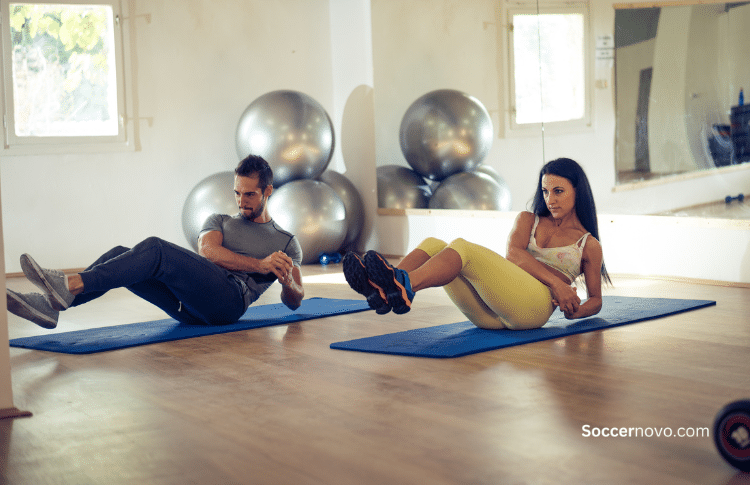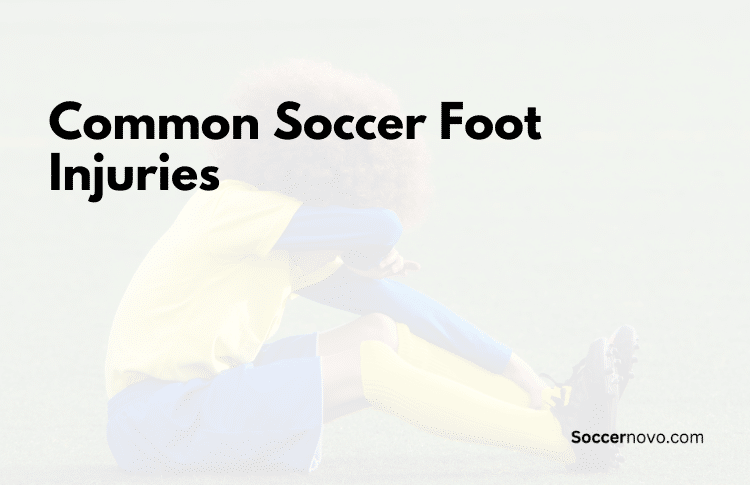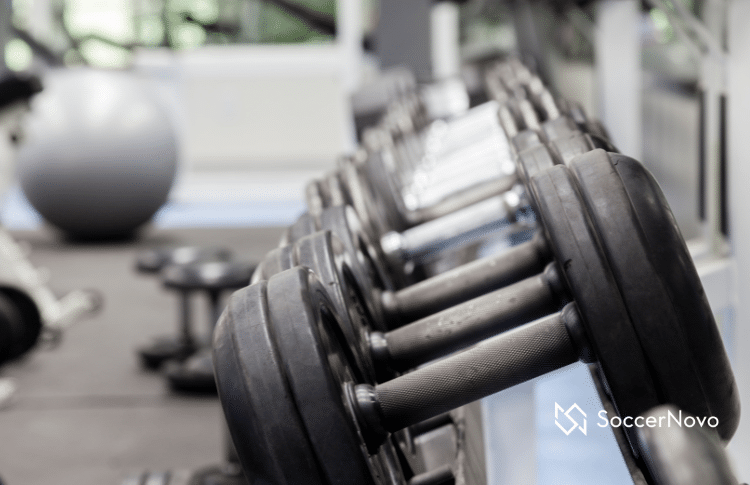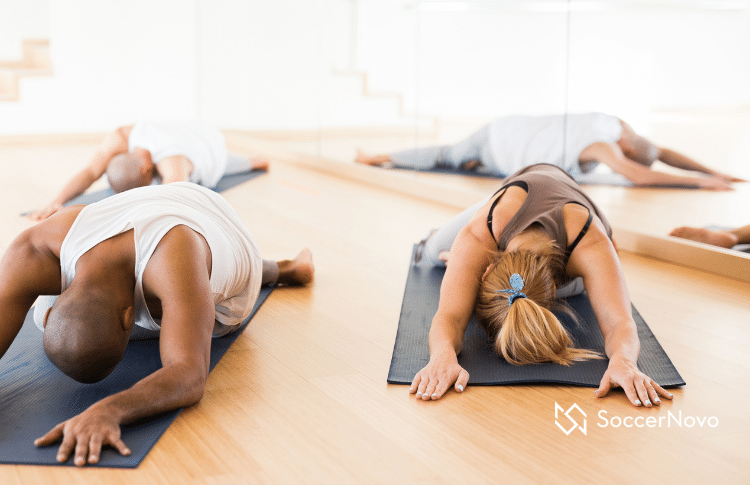Why Core Strength is Important for Soccer Players
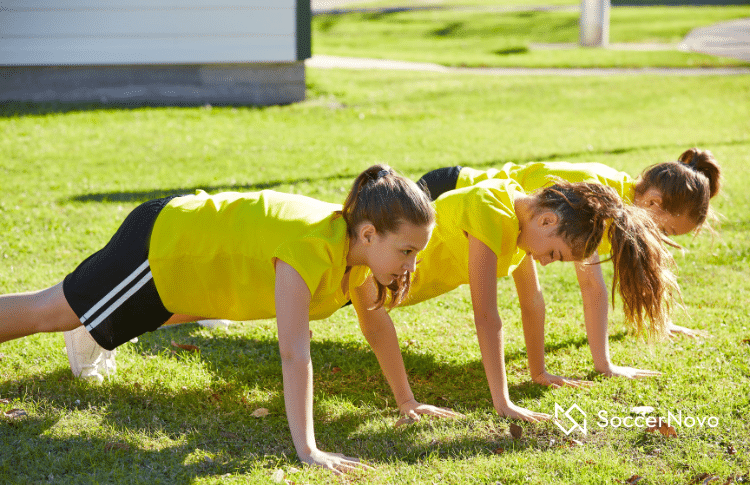
Your core muscles, which include your abs, obliques, lower back, and hips, play an important role in helping you maintain balance and stability on the soccer field.
Without a strong core, you may struggle to maintain your balance when making quick turns or sudden stops, which can significantly impact your performance.
For soccer players, a strong core can also improve overall power and speed. This can help you gain an edge over your opponents and make a significant difference in your overall performance on the field.
Ready to take your game to the next level? By focusing on exercises that target your core muscles, you can improve your balance, stability, power, and speed, ultimately helping you become a stronger and better player.
In this article, we’ll explore why core strength is important for soccer players and ways you can strengthen that area of your body.
The Importance of Core Strength in Soccer
Improved Balance and Stability
A strong core helps you maintain balance and stability while running, jumping, and changing direction on the field.
When your core muscles are weak, your body is more prone to wobbling and losing balance, making it harder to control the ball and maintain proper form when kicking or passing.
Increased Power and Explosiveness
Your core muscles contribute to the power and explosiveness in your movements on the field.
A strong core allows you to transfer power from your lower body to your upper body more efficiently, which can result in more powerful shots, headers and passes.
Reduced Risk of Injury
Without proper core strength, your body is more prone to overuse injuries, muscle strains, and lower back pain.
By strengthening your core, you can improve your overall stability and reduce the risk of injury during training and games.
How Do I Know If My Core is Strong?
To determine if your core is strong, you can perform a few simple tests. These tests will help you identify any weaknesses in your core and allow you to work on strengthening those areas.
Plank Test
One way to test your core strength is by doing a plank. Start by getting into a push-up position with your hands directly under your shoulders.
Lower your forearms to the ground, keeping your elbows directly under your shoulders. Your body should form a straight line from your head to your heels.
Hold this position for as long as you can. If you can hold the plank for at least 60 seconds, your core is considered strong.
Leg Raise Test
Another way to test your core strength is by doing leg raises.
Lie on your back with your arms at your sides. Lift your legs off the ground and hold them straight up in the air. Slowly lower your legs towards the ground, stopping before they touch the floor.
If you can do this without arching your back or using momentum, your core is considered strong.
Side Plank Test
The side plank is another great way to test your core strength.
Start by lying on your side with your legs straight. Prop yourself up on your forearm, keeping your elbow directly under your shoulder. Your body should form a straight line from your head to your feet. Hold this position for as long as you can.
If you can hold the side plank for at least 30 seconds on each side, you most likely have good core strength.
What Happens When Your Core is Weak?
When your core is weak, it can negatively impact your performance on the soccer field. Here are a few things that can happen:
- Decreased Stability: A weak core can lead to decreased stability, balance, and coordination. This can make it difficult to control your movements, change direction quickly, or maintain your balance when making contact with the ball or other players.
- Increased Risk of Injury: A weak core can also increase your risk of injury. Without a strong core, your body is more likely to compensate by using other muscles and joints, which can lead to overuse injuries.
- Reduced Power and Endurance: Your core muscles are responsible for generating power and providing endurance during physical activity. If your core is weak, you may struggle to generate enough power to shoot the ball or run at full speed for an extended period of time.
- Poor Posture: A weak core can also lead to poor posture, which can impact your overall performance. Poor posture can make it difficult to move efficiently and can cause unnecessary strain on your muscles and joints.
Exercises to Improve Core Strength for Soccer
As a soccer player, having a strong core is crucial for improving your performance on the field. Here are some exercises that can help you improve your core strength:
Planks
To perform a plank, start by getting into a push-up position, but instead of lowering yourself down, hold your body in a straight line from your head to your toes.
Make sure to engage your abs and hold the position for as long as you can. As you get stronger, you can increase the amount of time you hold the plank.
Russian Twists
To do a Russian twist, start by sitting on the ground with your knees bent and your feet flat on the floor. Lean back slightly and lift your feet off the ground. Hold a weight or a medicine ball in front of your chest and twist your torso to one side, then twist to the other side.
Repeat for several reps.
Medicine Ball Throws
To complete a medicine ball throw, stand with your feet shoulder-width apart and hold a medicine ball at chest level. Twist your torso to one side and then explosively throw the ball to a partner or against a wall.
Catch the ball and repeat on the other side.
Incorporating Core Workouts into Your Training Routine
Here are some tips to keep in mind as you are working out your core:
1. Focus on Functional Movements
When selecting core exercises, focus on functional movements that mimic the actions you perform on the field.
For example, exercises like planks, side planks, and bird dogs help improve your stability and balance, which is crucial for quick changes of direction and maintaining your position on the field.
2. Incorporate Resistance Training
Resistance training is an excellent way to build core strength and improve your overall performance.
Exercises like cable rotations, medicine ball throws, and Russian twists help target your obliques and improve your rotational power, which is essential for kicking and passing accuracy.
3. Don’t Forget About Recovery
While it’s essential to challenge your core muscles with intense workouts, it’s equally important to allow for proper recovery time.
Incorporating foam rolling and stretching exercises into your routine can help alleviate soreness and prevent injury.
4. Consistency is Key
To see real results, you must be consistent with your core workouts. Aim to incorporate at least two to three core workouts per week into your training routine and gradually increase the intensity and duration of your workouts over time. With time, you’ll find that 15 minutes, two or three times a week will do wonders for your core strength.
Final Thoughts
By now I hope you realize how essential your core strength is.
By building a stronger core body, you’ll improve your performance and reduce the risk of common soccer injuries.
By incorporating core exercises into your training routine, you can enhance your stability, balance, agility, and power, which are all crucial for success on the field.
Moreover, a strong core can help players maintain proper posture and alignment, which can prevent strain on the back, hips, and knees.
Remember to take care of your body! Core workouts should be part of your training routine especially as you get older.

Written By: Beau Bridges
Beau is the founder of SoccerNovo, dedicated to helping players and parents navigate the youth soccer landscape. As a former youth coach and soccer parent, he shares insights on player development, recruiting, and the ever-evolving soccer scene in the U.S.
Let’s connect


